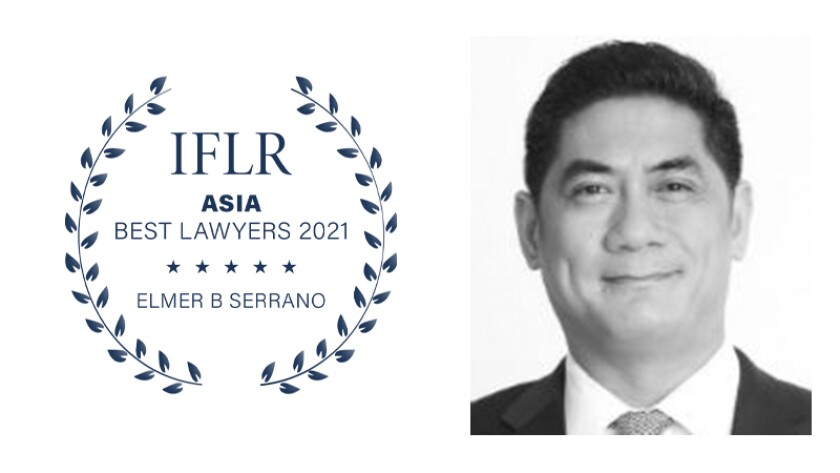As the recognised lawyer, what do you consider to be the greatest achievements of your career?
In a previous article, I spoke of the highlights in my legal career but now realise that I am at a point when clients have come to see me more as their partner with a contribution to make.
In 2016, I helped arrange my clients’ joint acquisition of control over the largest integrated shipping and logistics company in the country and for that role, I was invited to sit in that publicly-listed company’s Board of Directors. This year, in 2021, that acquisition turns full circle, as one of those clients consolidated control and made that company a subsidiary and I am privileged to continue a leadership role there. With integrity and value accretion, I transcended from being an external adviser to a real partner, integral to my client’s business.
What advice would you give to lawyers in junior positions to encourage them to work towards success?
Keep the Faith, Stay Optimistic - where you are now is not a gauge of where you will be 5, 10 or 15 years from today. And even if your career seems slow at some points, keep on moving forward. I’ve seen clients build a business empire in a fraction of a lifetime and that still astounds me today, considering I grew with them. In my own humble way, the career I have built is a testament to that.
From being a new lawyer then starting out, doing groundwork for an influential firm, my seniors started to take notice. Early on, I became a young partner, left, joined a company that was starting to expand, contributed to its exponential growth, left again, back to the practice, solo initially and eventually took a risk and joined MVGS. I still pause sometimes in awe of what I have achieved. Not all lawyers are so fortunate and I will forever be grateful.
So, you, young lawyers, invest the time, hone your skills and protect your integrity, you will surprise yourself with what heights you can reach.
What does your firm do to nurture and promote talent?
Very early on after joining the firm, we made a conscious effort to introduce our new lawyers to clients so that with proper guidance, they develop confidence in dealing with clients and build foundations for a strong working relationship. This is the complete opposite of other firms’ policy of keeping client interaction of junior lawyers at a minimum. We believe early exposure and gathering of experience is one of the best training tools we have and in the long run, this practice maintains the consistent quality of our service to the satisfaction of our clients.
If you could introduce one policy across the entire legal profession what would it be?
I would encourage experimentation with flexible work schedules and arrangements for lawyers. Legal practice is very stressful and with this pandemic, we have observed that it is one sector that is rather suited to working remotely.
Beyond Covid-19, the legal profession can help lawyers cope with stress by allowing them to work from home on certain days. Of course, I still believe social interaction to be a strong catalyst of achievement but coordinated scheduling among team members can allow lawyers to stay home more than before and hopefully achieve more of that elusive work-life balance. I myself sometimes prefer working out of the office pre-pandemic after usual meetings with clients and it can be surprisingly refreshing and can even improve productivity and efficiency.
Are there any initiatives in the firm to help your clients deal with the repercussions of the Covid-19 pandemic?
Early in the pandemic, our firm undertook several initiatives to help our clients cope by keeping them informed. But the pandemic has lasted longer than people had hoped or planned for. We are keeping a close watch on our clients’ businesses and have taken an even more proactive approach by pointing out potential issues and problems, the latest rules that apply to them, especially incentives, recovery measures and restrictions brought about by the pandemic.
We guide them on how to address or mitigate concerns. We even identify opportunities that they can capitalise on.
Market trends
What trends from 2021 do you see sticking around into 2022 and beyond in your field of expertise?
Digitalisation, e-commerce and online services soared to record levels during the pandemic. Almost all services are now available at the tip of our fingertips online. Leapfrog in technology and the consumer’s comfort in its use will be the indelible legacy of this pandemic and will be the norm long after it is over.
In the field of banking and finance, financial inclusion through digitalisation is a recurring theme. I am fortunate to be legal counsel to premier banking/financial industry associations that are at the forefront of the country’s digital landscape transformation, including the designated Philippine Payments Systems Management Body. I am privileged to have played an instrumental role in this digital transformation.
Given the current conditions in your country what would you consider to be the market outlook over the coming year?
We started this year with optimism in rebuilding. However, new waves and variants of Covid-19 ground the economy to a halt and took back many of the gains achieved.
The upcoming 2022 elections will be a major factor and may cause the market to be tentative. Through all this, banks will still be looking to minimise defaults and restructure loans of clients that have been badly affected by the pandemic. Stronger capitalised companies on the other hand will be looking to acquire and consolidate the market, moreso with government-sponsored incentives.
What kind of work do you expect will keep you busy over the next 12 months?
I still think our firm’s core practice areas of M&A, banking and finance and capital markets will be very active. Nearly two years into the pandemic, resources and businesses still continue to consolidate. The capital and debt markets are being tapped to build capacities and for some, to expand and acquire, especially in the tech industry. The ever-evolving banking regulations in aid of government recovery measures require practitioners to be responsive and agile in order to keep up.
Are there any upcoming regulatory changes or initiatives that investors should be aware of?
The Bayanihan to Recover as One Act (BARO), enacted in September 2020, affords a good deal of breaks and exemptions, including the increased merger review threshold to $1 billion until 2022 from $48 million pre-pandemic.
In addition, legislative bills strengthening e-commerce consumer protection are underway, a state recognition of the crucial role this sector is playing and will continue to play. There are also strong moves to liberalise certain industries, specifically public utilities.
Finally, there is a marked trend from the Philippine Securities & Exchange Commission and the Philippine Stock Exchange to enhance protection and participation of minority investors.
What do you feel is the biggest misconception others have about your market?
Preconceptions of instability and volatility continue to plague the Philippines but I believe the legal framework in the Philippines is progressive and responsive. The Philippines monitors and is keen to adopt global best practices. Implementation and enforcement is still evolving but the new generation of professionals working in government are intent at change for the better.
What is the one thing you think the IFLR’s international audience should know about how to successfully do business in your market?
The Philippines’ value proposition remains sound. Despite the conservative leaning of our laws, the country remains to be investor-friendly if you know where to look, how to operate here and of course, have expert legal advice. Commerce and its legal frameworks are opening up to change and one has to be ready to ride this positive wave.

Elmer B Serrano
Senior partner
Martinez Vergara Gonzalez & Serrano
T: +63 2 687 1195
Elmer B Serrano is a senior partner of Martinez Vergara Gonzalez & Serrano. His strong M&A experience spans nearly three decades, having provided strategic advice and solutions on several of the largest and most notable mergers and acquisitions across a wide range of industries, strongest in banking, shipping and gaming sectors.
Elmer is named ‘Asia Best Lawyer’ by IFLR since 2020, having been consistently ranked ‘Highly Regarded’ in banking and finance, M&A and capital markets by IFLR1000. He is also recognised as a ‘Leading Individual’ by The Legal 500 Asia Pacific in recognition of his solid experience and entrepreneurial approach and is recommended for M&A, Capital Markets and Competition.
Elmer obtained his JD from Ateneo de Manila University.


